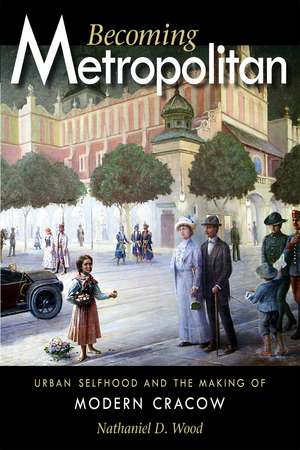Becoming Metropolitan: Urban Selfhood and the Making of Modern Cracow: NIU Series in Slavic, East European, and Eurasian Studies
Autor Nathaniel D. Wooden Limba Engleză Hardback – 15 iun 2010
The “Age of Great Cities” erupted in East Central Europe in the last quarter of the 19th century as migrants poured into imperial and regional capitals. For citizens of places like Cracow, discovering and enacting metropolitan identities reinforced their break from a provincial past while affirming their belonging to “modern European civilization.” Strolling the city streets, sipping coffee in cafés, riding the electric tram, and reading the popular press, Cracovians connected to modern big-city culture. In this lively account, Wood looks to the mass circulation illustrated press as well as to supporting evidence from memoirs and archives from the period to present Cracow as a case study that demonstrates the ways people identify with modern urban life.
Wood’s original study represents a major shift in thinking about Cracovian and East Central European history at the turn of the century. Challenging the previous scholarship that has focused on nationalism, Wood demonstrates that, in the realm of everyday life, urban identities were often more immediate and compelling. Becoming Metropolitan will appeal to scholars and students of urban history and the popular press, as well as to those interested in Polish history, Eastern European history, and modern European history.
Din seria NIU Series in Slavic, East European, and Eurasian Studies
-
 Preț: 138.18 lei
Preț: 138.18 lei -
 Preț: 89.68 lei
Preț: 89.68 lei -
 Preț: 197.11 lei
Preț: 197.11 lei -
 Preț: 185.88 lei
Preț: 185.88 lei -
 Preț: 239.52 lei
Preț: 239.52 lei -
 Preț: 169.95 lei
Preț: 169.95 lei -
 Preț: 131.39 lei
Preț: 131.39 lei -
 Preț: 130.71 lei
Preț: 130.71 lei -
 Preț: 216.21 lei
Preț: 216.21 lei -
 Preț: 219.33 lei
Preț: 219.33 lei -
 Preț: 114.05 lei
Preț: 114.05 lei -
 Preț: 238.40 lei
Preț: 238.40 lei -
 Preț: 255.55 lei
Preț: 255.55 lei -
 Preț: 179.03 lei
Preț: 179.03 lei -
 Preț: 205.71 lei
Preț: 205.71 lei -
 Preț: 190.06 lei
Preț: 190.06 lei -
 Preț: 153.39 lei
Preț: 153.39 lei -
 Preț: 255.62 lei
Preț: 255.62 lei -
 Preț: 127.66 lei
Preț: 127.66 lei -
 Preț: 200.18 lei
Preț: 200.18 lei -
 Preț: 131.46 lei
Preț: 131.46 lei -
 Preț: 285.23 lei
Preț: 285.23 lei -
 Preț: 191.59 lei
Preț: 191.59 lei -
 Preț: 175.99 lei
Preț: 175.99 lei -
 Preț: 215.93 lei
Preț: 215.93 lei -
 Preț: 177.43 lei
Preț: 177.43 lei -
 Preț: 150.97 lei
Preț: 150.97 lei -
 Preț: 283.86 lei
Preț: 283.86 lei -
 Preț: 185.25 lei
Preț: 185.25 lei -
 Preț: 216.00 lei
Preț: 216.00 lei -
 Preț: 214.64 lei
Preț: 214.64 lei -
 Preț: 178.19 lei
Preț: 178.19 lei -
 Preț: 136.13 lei
Preț: 136.13 lei -
 Preț: 201.03 lei
Preț: 201.03 lei -
 Preț: 185.82 lei
Preț: 185.82 lei -
 Preț: 108.71 lei
Preț: 108.71 lei -
 Preț: 191.37 lei
Preț: 191.37 lei -
 Preț: 136.13 lei
Preț: 136.13 lei -
 Preț: 118.20 lei
Preț: 118.20 lei -
 Preț: 261.47 lei
Preț: 261.47 lei -
 Preț: 202.52 lei
Preț: 202.52 lei -
 Preț: 162.54 lei
Preț: 162.54 lei -
 Preț: 223.69 lei
Preț: 223.69 lei -
 Preț: 270.18 lei
Preț: 270.18 lei -
 Preț: 158.38 lei
Preț: 158.38 lei
Preț: 351.49 lei
Nou
Puncte Express: 527
Preț estimativ în valută:
67.26€ • 70.37$ • 55.87£
67.26€ • 70.37$ • 55.87£
Carte disponibilă
Livrare economică 13-27 martie
Livrare express 26 februarie-04 martie pentru 41.16 lei
Preluare comenzi: 021 569.72.76
Specificații
ISBN-13: 9780875804224
ISBN-10: 0875804225
Pagini: 268
Dimensiuni: 152 x 229 x 23 mm
Greutate: 0.59 kg
Ediția:1
Editura: Northern Illinois University Press
Colecția Northern Illinois University Press
Seria NIU Series in Slavic, East European, and Eurasian Studies
ISBN-10: 0875804225
Pagini: 268
Dimensiuni: 152 x 229 x 23 mm
Greutate: 0.59 kg
Ediția:1
Editura: Northern Illinois University Press
Colecția Northern Illinois University Press
Seria NIU Series in Slavic, East European, and Eurasian Studies
Recenzii
“An original work that challenges the reader to question whether national issues really were upmost in the minds of early twentieth-century rank-and-file Cracovians. As such, Becoming Metropolitan doubtless will spark discussion and interest in the field of Polish urban history.”—Patrice M. Dabrowski, Harvard University
Notă biografică
Nathaniel D. Wood is Assistant Professor of History at the University of Kansas.
Descriere
The “Age of Great Cities” erupted in East Central Europe in the last quarter of the 19th century as migrants poured into imperial and regional capitals. For citizens of places like Cracow, discovering and enacting metropolitan identities reinforced their break from a provincial past while affirming their belonging to “modern European civilization.” Strolling the city streets, sipping coffee in cafés, riding the electric tram, and reading the popular press, Cracovians connected to modern big-city culture. In this lively account, Wood looks to the mass circulation illustrated press as well as to supporting evidence from memoirs and archives from the period to present Cracow as a case study that demonstrates the ways people identify with modern urban life.
Wood’s original study represents a major shift in thinking about Cracovian and East Central European history at the turn of the century. Challenging the previous scholarship that has focused on nationalism, Wood demonstrates that, in the realm of everyday life, urban identities were often more immediate and compelling. Becoming Metropolitan will appeal to scholars and students of urban history and the popular press, as well as to those interested in Polish history, Eastern European history, and modern European history.
